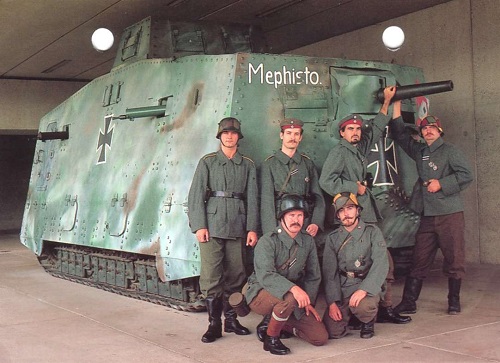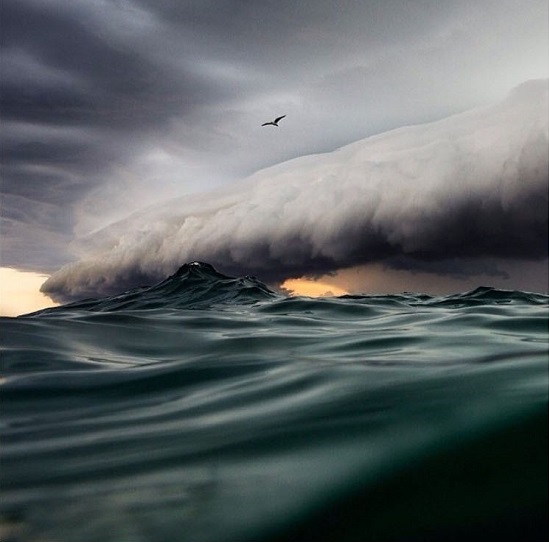
An open thread where, at your leisure, you can discuss anything you like, well, within reason and the Comments Policy. Include here news and views, plus any notable personal experiences from the week and the weekend.
For climate topics please use the most recent Climate clippings.
The gentleman in the image is Voltaire, who for a time graced the court of Frederick II of Prussia, known as Frederick the Great. King Fred loved to talk about the universe and everything at the end of a day’s work. He also used the salons of Berlin to get feedback in the development of public policy.
Fred would only talk in French; he regarded German as barbaric. Here we’ll use English.
The thread will be a stoush-free zone. The Comments Policy says:
The aim [of this site] is to provide a venue for people to contribute and to engage in a civil and respectful manner.
Here are a few bits and pieces that came to my attention last week.
1. Anzac Day
The Australian War Memorial tells us:
Anzac Day goes beyond the anniversary of the landing on Gallipoli in 1915. It is the day on which we remember Australians who served and died in all wars, conflicts, and peacekeeping operations. The spirit of Anzac, with its human qualities of courage, mateship, and sacrifice, continues to have meaning and relevance for our sense of national identity.
But more than 90% of the focus remains on Gallipoli. I think I’m joining military historian Jonathan King (here and here) in saying that Gallipoli is becoming a bit of a circus and after 100 years and that it is time to move the focus to the Western Front. Happens that on April 25 1918 the Australians were engaged with the Germans at Villers-Bretonneux where they won an important battle. Some 6,000 are gathering at Villers-Bretonneux this year to remember.
Australia lost around 46,000 on the Western Front (8,709 at Gallipoli).
Amongst the many memorable programs I heard and saw was Richard Fidler on the nature of trench warfare, on the use of tanks and how the Australians souvenired the German tank Mephisto, now in the Queensland Museum.

2. Migrant shipwreck near Italy
Other than Anzac, the drowning of more than 800 migrants in the Mediterranean was for me the story of the week. That makes more than 1,750 migrants perishing in the Mediterranean since the start of the year – more than 30 times higher than during the same period of 2014.
The drownings seem to have shocked the Europeans into some action, with other countries assisting Italy in rescue efforts, and looking for longer term solutions.
Abbott was at hand to advise them to turn back the boats, which was too much for Ukip Party leader Nigel Farage. Julie Bishop was more circumspect, saying that solutions should vary according to circumstances.
3. Sydney storm
From the Tele on Thursday:
NSW Premier Mike Baird has been “shocked by the size and scale” of the devastation caused by this week’s storms that continue to leave thousands of people without power and entire communities cut off by floodwaters.
The town of Dungog was particularly hard hit, though perhaps not as bad as Grantham in 2011, where the town was washed away.
Tony Abbott said the storm was a one in 10 year event. I heard someone sensible say that it depended where you were. In some places it was the worst ever.
You can google Sydney storm images. Here’s my favourite from a selection on social media:

Here’s the Sharks playing the Rabbitohs when the rain had barely begun:

QUEENSLAND voters have strongly backed Premier Annastacia Palaszczuk’s handling of outcast MP Billy Gordon, the latest opinion poll suggests.
The Roy Morgan poll shows Ms Palaszczuk and the Labor Party have pulled ahead since she called for Mr Gordon to be expelled from the party over his undisclosed criminal record and allegations of domestic violence.
Ms Palaszczuk’s preferred-premier rating has increased to 61.5 per cent over Opposition Leader Lawrence Springborg’s 38.5 per cent since March 15.
Labor is currently leading the LNP 52.5-47.5 on a two-party-preferred basis, according to the poll.
Some of us are getting sick of Springborg playing politics over the Billy Gordon issue.


Binge-watched The Walking Dead so I missed everything. 🙂
Storm image brings to mind the parting of the Red Sea in Ridley Scott’s Exodus which is exceedingly excessive in a fun kind of way.
Don’t know if I told you guys but I’ve started writing a crime novel. Only have to rely on pictures from teh internet for research (mostly) so it doesn’t take the physical toll on me that going round my bookshelves getting books or moving around boxes of research material takes on me when writing history, which is why I gave up on that history I was writing. Physically it was beyond me. (I don’t have the strength to make my own bed.)
But after months of just reading books and watching DVDs I had to start writing something or I would’ve gone nuts or something.
Don’t know how I’ll go. Never seriously tried writing a novel before. If I put any of it up on teh internet will let youse know.
Cheers.
Good luck, Paul, with the crime writing and all credit to you for adapting to what’s possible in your circumstances.
John Quiggin puts the Gallipoli campaign into geopolitical context.
If you’d asked the Anzacs why they were there, most likely they would have said they were defending the British Empire. Yet Britain itself was never going to be invaded and there was no necessary reason why Britain should have intervened at all, except to keep Europe divided.
Yes. The origins of WW1 seem to have been an enormous mistake on all sides. There was a point (with Russian mobilisation at the end of July 1914 IIRC) where war just became unavoidable. It was a clash of empires but there was much more to it than that. National pride, concepts of national honour, belief it would be a short glorious, war, that took no account of the potential application of modern military technology before and during the war, etc etc. If I sat here and thought about it I could probably go on and on. Margaret MacMillan is very good on the origins of the war. Of the various accounts I’ve read which respectively place blame on the Germans or the Serbs or the UK and so on, she is possibly the best.
The War that Ended Peace.
Paul, I thought Quiggin simplified things a bit – inevitable in a short post. Personally I did an essay on the causes of WWI for History 101 over 50 years ago and wouldn’t say I’m on top of it now.
In my sortie into Prussian history, I recall that Germany feared a war on two fronts. The whole thing possibly went pear-shaped when Hindenburg and Ludendorff wanted to keep fighting in the east after initial success and virtually took over the German state. They were two serious warmongers who did need to be stopped.
I often wonder about the population of the world had no wars or genocides occurred in the last, say, 300 years.
What the world would be like today.
The technology not pursued and the technology instead pursued.
The population.
The make up of certain countries without the two way migration caused by invasion and fleeing due to these events.
( Useless pondering I know, but …… )
” effect ” after the second ” population “.
Christopher Clark in The Sleepwalkers: How Europe went to War in 1914 has an account in which Russia gets more responsibility for pushing matters than other accounts, though no one comes out particularly well in a process that seemed to have a result that no one was really looking for at least that year
I read somewhere that the railways were the problem. You could put your army on the trains and too the front to fast for diplomats to calm things down.